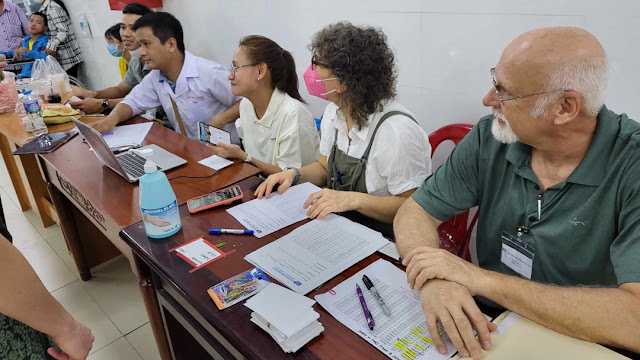 |
| The first stop is patient intake, with IEP's Amy and Dan on the right. |
This is my first medical mission and my first trip to Vietnam. I've seen so much in the two days of patient screening: the hopeful, the scared, the cute (especially the little girl with the Hello Kitty shirt that said super cute on the back), and the disappointed. Even though I've heard many stories about previous missions from my partner, I was not prepared for the humanity of the experience in just the first two days here.
Being involved in the patient intake process (the paperwork!) meant I did not get a chance to consistently observe all the patients and their deformities. But judging by the gait of some as they passed by our table, many have significant challenges they hope our team can fix through surgery.
After screening patients on Friday, we returned to the hospital Saturday morning to screen more. Being a Saturday, the hospital was quieter, but the hallways were still filled with families. The patients start at our desk to give us the basic information for our record-keeping and charts. From there, one of our team members takes photos and videos so we can document their conditions and how they walk. Then, they meet with our resident podiatrists and doctors to be evaluated for surgery.
We've screened 71 patients and scheduled 38 for surgery so far. The numbers often increase during the next week as more patients arrive with injuries sustained during our stay.
About halfway through Saturday morning, Dr. Nyska was called into the hall for a consultation with a patient. He met with a woman in her late thirties who was accompanied by her husband. The team last saw her in 2002, when she could not walk. Now, 20 years after Dr. Nyska operated on her, she was standing and walking unassisted. Since the surgery, she has married, started a business, and is financially successful and wants to become a financial donor to the mission. When Dr. Nyska tried to shake hands with the husband, the husband simply stepped forward and hugged him.
I felt honored to witness the reunion and see the difference the IEP team makes. What IEP does is about more than surgery and repairing limbs. It's about giving patients and their families more opportunities to participate in their communities — go to school, become more physically independent, work, and start businesses. All the things many of us take for granted.
IEP started coming to Vietnam 25 years ago to perform lower-extremity surgeries for patients in need. This is the team's fifteenth mission. The number of surgeries we've scheduled this year is slightly lower than in previous years, but we are still slated to perform nearly 40 surgeries over six days. IEP has changed the lives of hundreds of patients in its missions. I'm grateful to be a part of helping even more.
Dan Buntman



Comments
Post a Comment